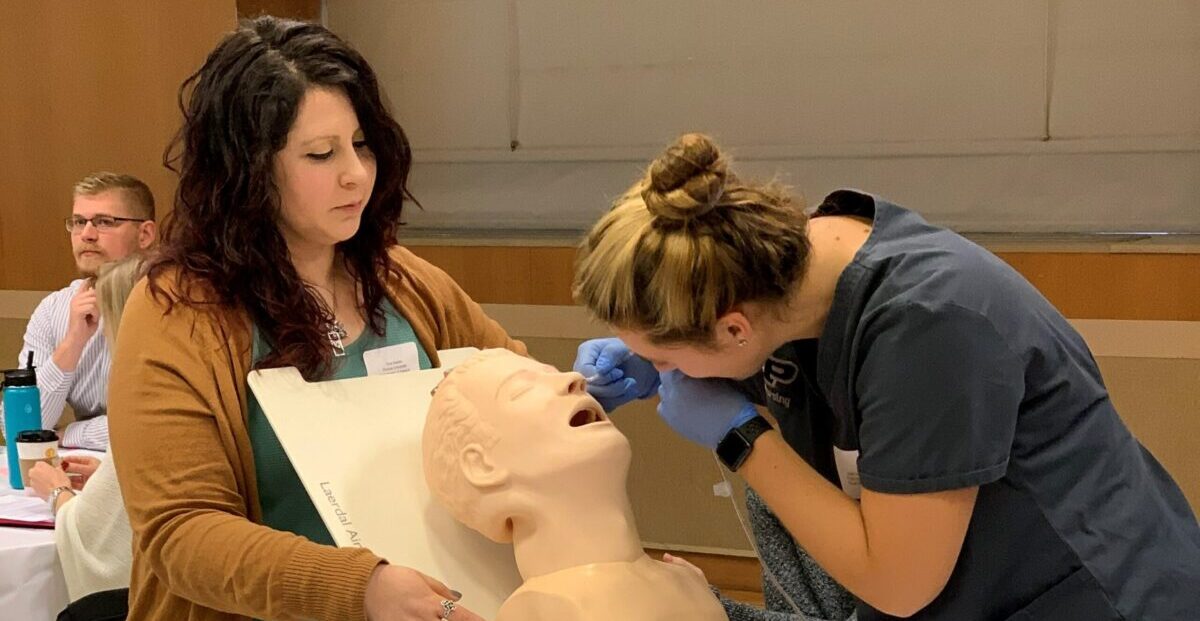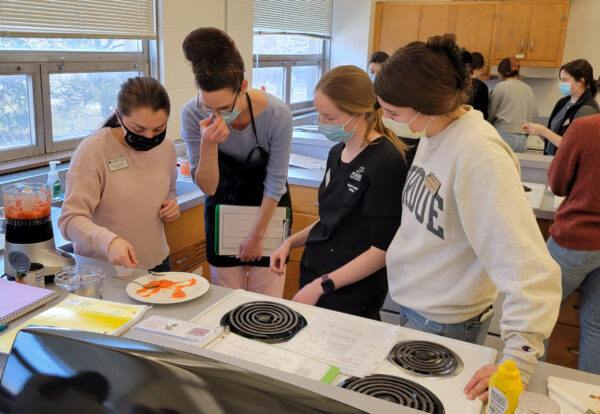Experiencing the other side: HHS interprofessional education demonstrates healthcare collaboration
Written By: Rebecca Hoffa, rhoffa@purdue.edu

A nursing student practices inserting a feeding tube during an interprofessional education event. Photo provided
Collaboration across health professions happens multiple times a day in the healthcare field. Research has shown patient outcomes are better when these collaborations work well, whether they occur in a hospital, clinic or other setting. When these collaborations are weak or nonexistent, the consequences can be significant, both for the patient and the healthcare team.
Interprofessional education (IPE) at Purdue University plays an important role in preparing students to effectively collaborate with other healthcare professionals when they enter the workforce. The programs bring together students from different disciplines to learn from each other through teamwork activities and gain new understanding of other health-focused professions.
Within Purdue’s College of Health and Human Sciences (HHS), students have a variety of opportunities to explore how their profession fits into the healthcare team and learn evidence-based tools to improve their collaboration skills, from externships and clinicals to simulation. To enhance these experiences, faculty throughout HHS and in other colleges at Purdue have worked together to create comprehensive interprofessional education events that mimic what students will likely face in their careers.
“One of the beauties of HHS is that the departments that would be working together in the care of patients, we all belong to the same college, so that helps really unite us when it comes to interprofessional education and gives us some ability to really collaborate when we plan these events,” said Dinah Dalder, clinical associate professor of nutrition science and director of the coordinated program in dietetics.
The Department of Nutrition Science participates in two IPE events for students who are part of the coordinated program in dietetics, which provides the didactic courses and supervised practice required for students to become entry-level dietitians. While students’ supervised practice offers some opportunities to experience interprofessional education firsthand, the IPE events supplement this to offer different scenarios that may not occur in students’ training.
The first event focuses on an ethical dilemma in palliative care in which a team of students from the coordinated program in dietetics; the School of Nursing; the Department of Speech, Language, and Hearing Sciences; and the College of Pharmacy must collaborate to determine an evidence-based message and how it will be delivered by the team. Unlike in real-life situations, however, students received a do-over to revisit the situation based on what they’ve learned.

Students from the Department of Nutrition Science and the Department of Speech, Language, and Hearing Sciences work together to find the right food consistency for a dysphagia patient in their interprofessional education simulation.Photo provided
The second event pairs together the dietetics students with students in the speech-language pathology graduate program to determine diet recommendations for a patient with dysphagia, or difficulty swallowing, and a plan to communicate their recommendations.
“Including these kinds of activities in the curriculum helps set the tone that this is what we really need to promote once you get out into the workforce,” Dalder said.
In recent years, the Department of Speech, Language, and Hearing Sciences has worked to develop a dedicated interprofessional practice program to build upon existing opportunities where speech-language pathology and audiology graduate students work together and learn from each other.
In addition to the two events the department hosts in collaboration with the coordinated program in dietetics, the department offers additional opportunities for speech-language pathology and audiology students. These include an introductory event for graduate students in speech-language pathology, audiology and the College of Education’s applied behavior analysis program to develop elevator pitches to explain their roles; an event for audiology students to collaborate with nursing students to provide wellness screenings at the on-campus Nursing Center for Family Health; and on- and off-campus clinical practica where students can experience real interprofessional collaboration in their training.
“Going into interprofessional education, students assume everybody knows the value their profession adds to a patient’s care, and that’s just not so,” said Dawn Wetzel, clinical professor of speech, language, and hearing sciences. “I think it’s our job to prepare them on how to advocate for their profession and understand what other professions add to the care of their patient.”
Because nurses play a central role in the healthcare team, Esther Onuorah, lecturer of nursing, got her students involved in one of the IPE events after hearing about the opportunities from HHS faculty. She noted the experience was eye-opening for her students, who had never interacted with some of these professions previously.
“If you don’t know what the other person is doing, you don’t really see how important their role is.” Onuorah said.
Like Onuorah’s students, speech-language pathology graduate student Olivia Scheel gained a new level of comfort working with diverse healthcare professions after participating in these IPE opportunities.
“I think it’s unique talking with friends from my undergrad (program) and friends in different programs, and it is not common to get IPE experience first of all, but then to get multiple experiences with different disciplines, it is very, very cool that they intentionally set that up,” Scheel said.
As part of its strategic roadmap initiative to enrich the residential student experience, HHS plans to continue to build up interprofessional education opportunities throughout the college. Most recently, in spring 2022, the Department of Speech, Language, and Hearing Sciences; the Department of Nutrition Science; and the College of Pharmacy collaborated on a pilot IPE event that was centered around transgender care, further exploring issues in health equity and population health.
“We have a responsibility to give students these opportunities,” Wetzel said. “We produce leaders here, and this is a part of being a leader.”
Discover more from News | College of Health and Human Sciences
Subscribe to get the latest posts sent to your email.